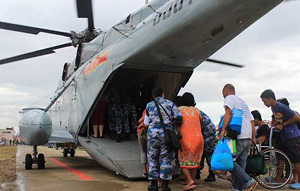Value-added tax reform expands
Updated: 2013-12-05 00:05
By Zheng Yangpeng and Lei Lei (China Daily)
|
|||||||||||
Rail and the postal service will be added to the value-added tax reform program starting on Jan 1, according to a statement after Wednesday's State Council executive meeting, presided over by Premier Li Keqiang.
The move followed the decision to expand VAT reform nationwide from the transport sector and six service sectors since Aug 1. After the rail sector is added, all of China's transportation sectors will have been included in the VAT reform.
The pilot program to replace the business tax with a value-added tax is part of the government's efforts to invigorate the country's small- and medium-sized enterprises, most of which are privately owned, and upgrade the economic structure.
Zeng Kanghua, a public finance professor at the Central University of Finance and Economics, hailed the swift expansion of the reform.
"The trial reform was first carried out in Shanghai in early 2012. From August that year, the reform was expanded to eight provinces and municipalities, and from this August, VAT reform in transport and six service sectors was expanded to the whole country. There are now only three or four sectors that are not covered by the program," he said.
The State Administration of Taxation has said the nationwide expansion is expected to cut 120 billion yuan ($19.7 billion) in taxes on companies in the pilot sectors this year.
But for the moment, not all companies in the pilot sectors have enjoyed fewer taxes.
This is because before the reform, some companies were subject to a business tax with a lower rate than the value-added tax.
For example, some transport companies were previously subject to a 3 percent business tax. But now, they are subject to an 11 percent VAT.
Experts said to ease the tax burden on companies, value-added tax rates should be reduced and the highest tax rates should be lowered.
Improve education
Li also vowed to improve education facilities in low-income areas, which mostly lie in central and western China, saying the improvements should meet the basic education requirements in three to five years.
The meeting asked provincial-level governments to allocate more of their education budgets to poor areas to build stronger schools and facilities, including desks, chairs, lab equipment and playgrounds.
Dormitories, toilets, cafeterias and bathrooms should meet basic living standards.
The move will benefit more than 40 million students in China's poor areas.
Officials also stressed that the improvements should be conducted in a transparent way.
The meeting also called for timely updates of legislation. Seven draft law amendments, including one on company management, one on customs and one on drug management, were passed at the meeting and will be submitted to the top legislature for further review.
Related Stories
Govt initiates city development plan 2013-12-04 09:49
Money and tax system reforms 2013-11-30 08:14
Belgium welcomes pact to prevent double taxation with China 2013-11-14 10:50
Ministries define new FTZ's import tax regulations 2013-10-25 07:27
New taxation preferential policy released 2013-10-18 10:52
Pingtan sets up local taxation bureau 2013-10-09 15:16
Today's Top News
Nations to jointly tap nuclear markets
Xi leads China's tributes to Mandela
Smog gives expats second thoughts
CSRC to boost IPO reform plan
Nelson Mandela has died: President Zuma
Li holds talks with French PM
UK set to OK Huawei cyber center
New cargo flight builds bonds with Russia
Hot Topics
Lunar probe , China growth forecasts, Emission rules get tougher, China seen through 'colored lens', International board,
Editor's Picks

|

|

|

|

|

|





